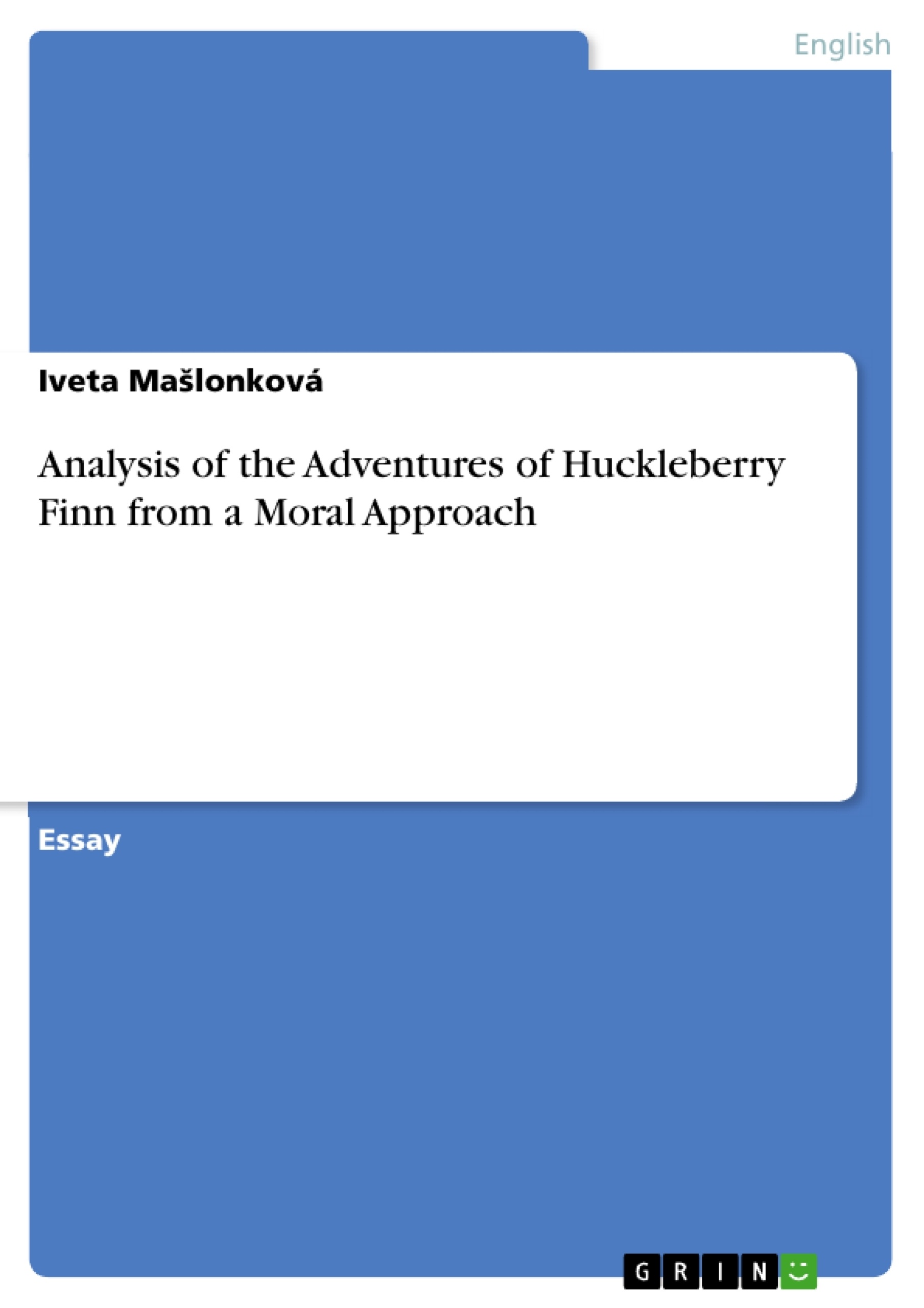In this essay I want to prove the moral value of the book ‘The Adventures of Huckleberry Finn’. According to moral approach literature and study of literature teach us the most fundamental, essential values of human moral. In the centre is the nature of man. It doesn’t consider literature to be just art, but it concentrates on the didactic function of literature. Some philosophers believed that literature can foster virtue. It is a source of moral and spiritual inspiration. Thank to literature we can become better people.
Inhaltsverzeichnis (Table of Contents)
- The Moral Value of 'The Adventures of Huckleberry Finn'
- Mark Twain's Perspective on Slavery
- The Origins and Effects of Racism
- The Civil War and the Reconstruction Period
- The Book 'The Adventures of Huckleberry Finn'
- Huckleberry's Internal Struggle
Zielsetzung und Themenschwerpunkte (Objectives and Key Themes)
This essay aims to analyze 'The Adventures of Huckleberry Finn' from a moral standpoint, demonstrating its value in teaching essential human values and highlighting its critique of slavery and societal prejudice. The essay explores the book's relevance in the context of Mark Twain's own experiences and the historical backdrop of slavery and racism in America.
- The Moral Impact of Literature
- The Social and Historical Context of Slavery in America
- The Nature and Perpetuation of Racism and Prejudice
- The Significance of 'The Adventures of Huckleberry Finn' as a Moral Commentary
- Huckleberry's Internal Conflict and Moral Evolution
Zusammenfassung der Kapitel (Chapter Summaries)
The essay begins by establishing the moral approach to literature, emphasizing its capacity to foster virtue and inspire moral and spiritual growth. It then delves into Mark Twain's personal experiences with slavery in his childhood and how his views evolved over time, influenced by his mother's empathy and later his wife's abolitionist family. The essay further explores the historical roots and consequences of racism, tracing its development from ancient Greek philosophy to the 19th century and its tragic culmination in the Holocaust. It then focuses on the Civil War and its aftermath, highlighting the continued oppression of African Americans despite the abolition of slavery. The Reconstruction period is described as a time of continued racial discrimination and injustice, despite the formal end of slavery. The essay then introduces 'The Adventures of Huckleberry Finn', situating it within the historical context of the post-slavery era and its controversial reception due to its frank depiction of racial prejudice and stereotypes. The essay analyzes Huckleberry's internal struggle, his conflict between societal expectations and his conscience, as he decides to help the runaway slave Jim.
Schlüsselwörter (Keywords)
This essay examines the themes of slavery, racism, prejudice, morality, and literature. Key concepts include the moral approach to literature, the historical context of slavery in America, the evolution of racist ideas, the Civil War and Reconstruction, and the characters and narrative of 'The Adventures of Huckleberry Finn'.
Frequently Asked Questions
What is the moral value of 'The Adventures of Huckleberry Finn'?
The book teaches fundamental human values by exploring the nature of man and highlighting the didactic function of literature as a source of moral inspiration.
How did Mark Twain's views on slavery evolve?
Influenced by his mother's empathy and later by his wife's abolitionist family, Twain's perspective shifted from accepting the societal norms of his childhood to a sharp critique of slavery.
What is Huckleberry Finn's internal conflict?
Huck struggles between the racist societal expectations of his time and his personal conscience, specifically when deciding whether to help Jim, a runaway slave.
What does the essay say about the history of racism?
It traces the roots of racism from ancient Greek philosophy through the 19th century, illustrating its tragic consequences like the Holocaust and continued post-Civil War discrimination.
Why was the book controversial after the Civil War?
It was controversial due to its frank depiction of racial prejudice, stereotypes, and the use of vernacular language that reflected the harsh realities of the Reconstruction period.
- Quote paper
- Bc. Iveta Mašlonková (Author), 2016, Analysis of the Adventures of Huckleberry Finn from a Moral Approach, Munich, GRIN Verlag, https://www.grin.com/document/381043



